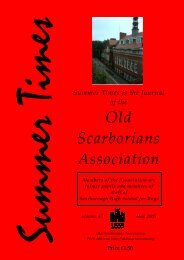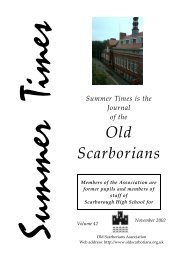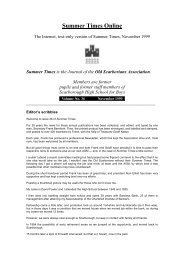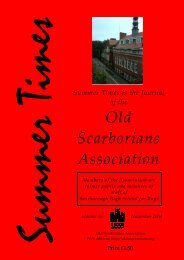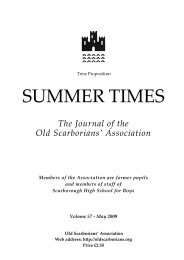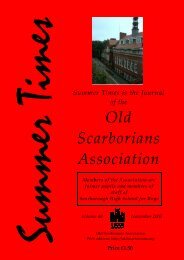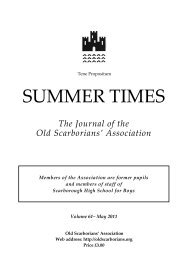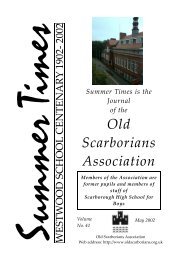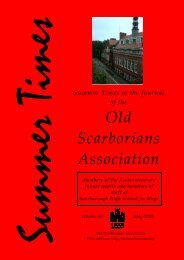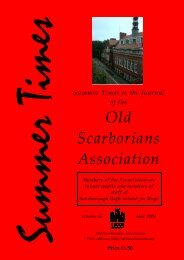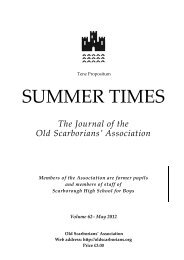May - Old Scarborians
May - Old Scarborians
May - Old Scarborians
Create successful ePaper yourself
Turn your PDF publications into a flip-book with our unique Google optimized e-Paper software.
48water. He probably believed that like him,their abilities would be somehow rewarded intheir professional life as they had been inSchool life. Some sponsorship from Hov,some advice and a good shove in the rightdirection would have been invaluable formany boys who had to compete in a worldwhere the gifted amateur didn’t always rise tothe top of the heap.We were lucky that he passed through Scarboroughon his effortless way to the immortality.At his funeral, though it must havebeen 20 years since he retired, the church wasfull and people of all ages and generationswere there to pay their last respects. I had theclear memory of that grin decorated with thespittle hanging from the pipe.A fine man; I wish I‘d known him better.FIVE THOUSAND MILESThe World War II experiencesof an infantry officerby Major George ReginaldHovington(Edited by Michael Rines)CHAPTER 1 1940World War II startedon September 3, 1939,but my call-up wasdeferred to Septemberthe following year,because I was a schoolmaster,at the ScarboroughBoys’ HighSchool. Then there wasa further delay, becauseI had attended a school camp atBromsgrove in the August, picking raspberriesfor the war effort. I was quarantined for amonth, because one boy who had been on thecamp died from polio and another was left acripple. As a result, I was not called up until17 October.I was posted as a private soldier to the Yorkand Lancaster Regiment at Pontefract, forbasic training. The only memories I have ofthis initiation into soldiering were the coarsenessand filthy habits of some of our intake,the endless drill, the bullying by ignorantNCOs and the soul-destroying daily task ofpolishing buttons and boots. After being thereonly a few weeks, we were all called out inthe middle of the night to extricate dead bodies,or parts of them, from houses in Sheffield,which had suffered a heavy blitz from Germanbombers.After three months, I was sent to an Officers’Corps Training Unit (OCTU), which was likea rest haven after Pontefract. The previouscommander of the unit had been sacked forintimating to the press that grammar schoolboys were incapable of accepting strict disciplineand would never make good officers.The new commander, therefore, took care torelax the discipline and adopt a much morepersonal and pastoral approach. Fillet steakand chips for breakfast, and rough cider atfour pennies a pint in every pub made us allput on weight, the more so because drill paradeswere seldom held, and then not takenseriously.When cricket started, I was made captain. Wedid not lose a match, and I think this was whyI was appointed head cadet at the end of thecourse. I little knew that this meant I wouldbe in charge of the final parade. Nobody gaveme any instruction for it -– I was just expectedto ‘know the drill.’Two hundred cadets were marched on to theparade ground, where I stood on a raisedplatform, isolated except for the bristlymoustachedRSM, standing behind me withhis cane and breathing into my buttocks.From the side, the brass hats, including a general,looked on with as much interest as if itwere a heavyweight fight.Fortunately, the RSM was like a mind reader,and corrected whatever mistakes I was going



